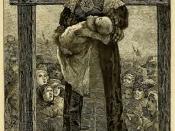Sin is the transgression of a moral code designated by either society or the transgressor. The Puritans of Boston in the novel, The Scarlet Letter, by Nathaniel Hawthorne, establish a rigid moral code by which to purge their society of deviants. As this society is inherently theocratic, the beliefs and restrictions established by religion are not only incorporated into law but constitute all law. In this manner, the moral code of the Puritan society thoroughly pervades the lives of its individuals, and any presence of iniquity is felt in all aspects of their lives. In The Scarlet Letter, the characters' lives
are controlled by the sin they commit.
Hester Prynne's adultery causes her alienation from the Puritan society in which she lives. After the term of her confinement ends, she moves into a remote, secluded cottage on the outskirts of town, inducing a physical separation from the townspeople. Because of this seclusion from society, the Puritans regard her with much curiosity and suspicion: "Children...would
creep nigh enough to behold her plying her needle at the cottage-window...and discerning the scarlet letter on her breast, would scamper off with a strange, contagious fear." In addition to the physical separation, a more intangible manner of exclusion also exists, in that Hester becomes a pariah. She is subject to derision and malice from the lowliest of vagrants to the most genteel of individuals of the community, though many are often the recipients of her care and attention: "The poor...whom she sought out to be the objects of her bounty, often reviled the hand that was stretched forth to succor them...Dames of elevated rank, likewise, were accustomed to distill drops of bitterness into her heart." Hester cannot feel any sort of kinship with the townspeople in light of the treatment she receives from them, thus...


